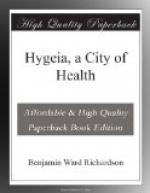Thus the cemetery holds its place in our city, but in a form much modified from the ordinary cemetery. The burial ground is artificially made of a fine carboniferous earth. Vegetation of rapid growth is cultivated over it. The dead are placed in the earth from the bier, either in basket work or simply in the shroud; and the monumental slab, instead of being set over or at the head or foot of a raised grave, is placed in a spacious covered hall or temple, and records simply the fact that the person commemorated was recommitted to earth in those grounds. In a few months, indeed, no monument would indicate the remains of any dead. In that rapidly-resolving soil the transformation of dust into dust is too perfect to leave a trace of residuum. The natural circle of transmutation is harmlessly completed, and the economy of nature conserved.
RESULTS.
Omitting, necessarily, many minor but yet important details, I close the description of the imaginary health city. I have yet to indicate what are the results that might be fairly predicted in respect to the disease and mortality presented under the conditions specified.
Two kinds of observation guide me in this essay: one derived from statistical and sanitary work; the other from experience, extended now over thirty years, of disease, its phenomena, its origins, its causes, its terminations.
I infer, then, that in our model city certain forms of disease would find no possible home, or, at the worst, a home so transient as not to affect the mortality in any serious degree. The infantile diseases, infantile and remittent fevers, convulsions, diarrhoea, croup, marasmus, dysentery, would, I calculate, be almost unknown. Typhus and typhoid fevers and cholera could not, I believe, exist in the city except temporarily, and by pure accident; small-pox would be kept under entire control; puerperal fever and hospital fever would, probably, cease altogether; rheumatic fever, induced by residence in damp houses, and the heart disease subsequent upon it, would be removed. Death from privation and from purpura and scurvy would certainly cease. Delirium tremens, liver disease, alcoholic phthisis, alcoholic degeneration of kidney and all the varied forms of paralysis, insanity, and other affections due to alcohol, would be completely effaced. The parasitic diseases arising from the introduction into the body, through food, of the larvae of the entozoa, would cease. That large class of deaths from pulmonary consumption, induced in less favoured cities by exposure to impure air and badly ventilated rooms, would, I believe, be reduced so as to bring down the mortality of this signally fatal malady one third at least.




